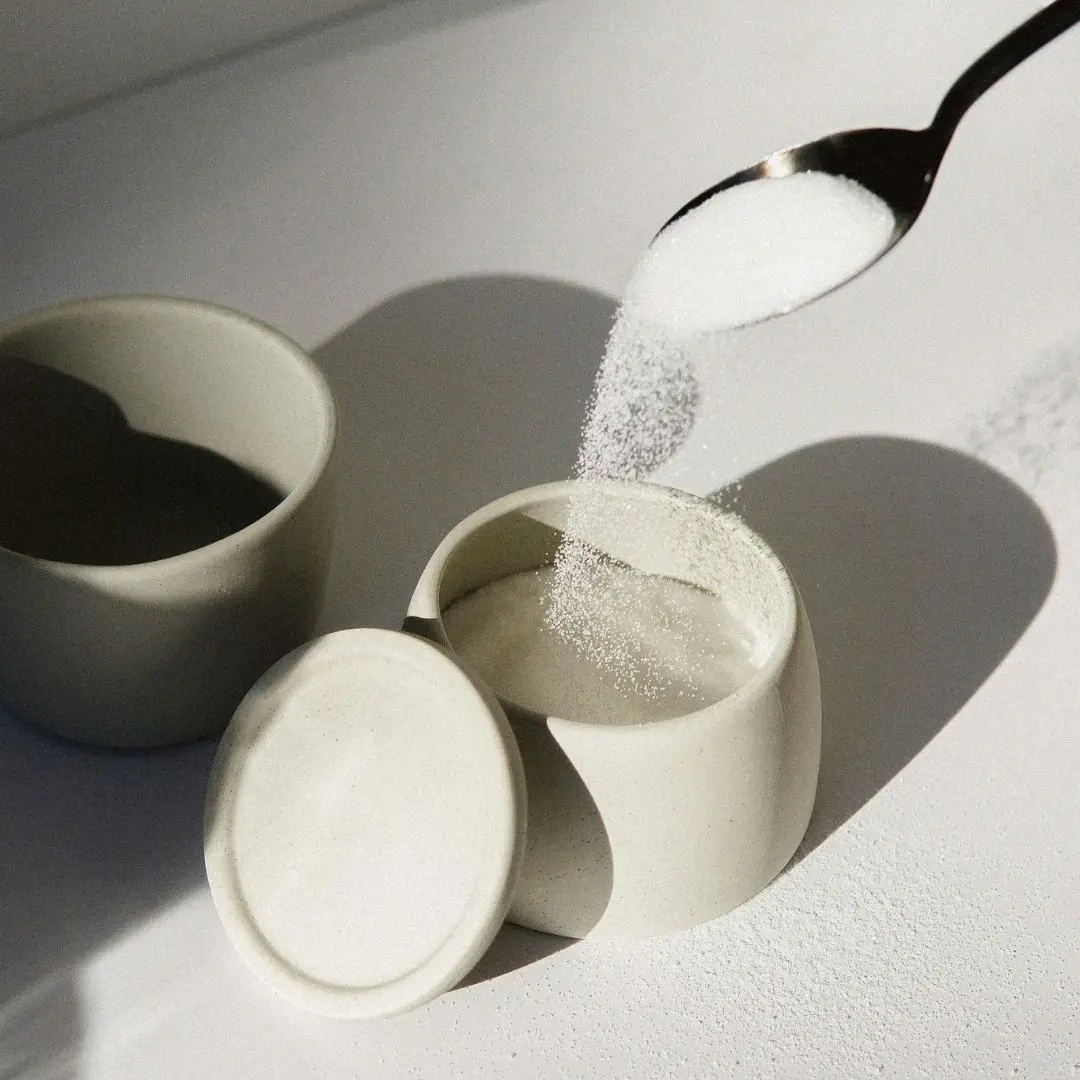
A spoonful of sugar helps the medicine go down…In a most delightful way 🎶
Aspartame, stevia, glycerin, oh my!
Many of us are trying to be more mindful of our sugar intake for a host of health reasons. Moderating sugar intake can contribute to better overall health, including better skin health, weight management, and dental health. Limiting sugar intake can also enhance nutrient intake, by cutting “empty calories”, which also supports stable blood sugar levels, and can help reduce the risk of chronic diseases.
Cutting sugar might be easier said than done for those of us with a sweet tooth. What do we do when the sweet cravings sneak in despite our best intentions? Alternative sweeteners like aspartame, stevia, or glycerin could help satisfy sugar cravings, with a lower glycemic index and less impact on blood sugar, but understanding the differences between all these options can be…sticky. If you’re trying to do better by your body, how do you know which sweetener to choose? There are a number of factors to consider, so here’s the short and sweet of it.
The science of sweet
First up is taste. The sweetness level of alternative sweeteners can vary a lot. Aspartame and stevia are both 100-300 times sweeter than regular table sugar (also known as sucrose). However, that's where the similarities between aspartame and stevia end. Aspartame is an artificial sweetener, synthesized in a laboratory, while stevia is a natural sweetener that comes from the leaves of the herb Stevia rebaudiana. Aspartame is made from two amino acids, aspartic acid, and phenylalanine, while stevia gets its sweet taste from naturally occurring compounds called steviol glycosides, mainly stevioside and rebaudioside.
Glycerin is a bit different from aspartame and stevia. For starters, it’s not nearly as sweet, being only about 60% as sweet as sucrose. Glycerin, also known as glycerol, is considered a sugar alcohol, and is a naturally-occurring syrup-like liquid found in all types of fats, including healthy fats derived from plants. Thanks to its moisture-loving, humectant properties, glycerin is widely used in a range of cosmetic and food applications as a moisturizer or solvent.
While you won’t find aspartame or even stevia in Apothékary products, you may notice that glycerin is an ingredient in Apothékary’s tincture formulations. Glycerin serves important functions in the tinctures, as a carrier to deliver the benefits of herbal extracts in a tasty and accessible format after alcohol evaporation, while also helping to preserve all that herbal goodness, capturing a fresh bouquet of botanical wellness so you can easily keep it with you in a pocket size bottle, to take whenever you like.
Health effects of sweeteners
There are a few differences to keep in mind when it comes to the health effects of aspartame, stevia, and glycerin. The glycemic index, or impact on blood sugar levels, of both aspartame and stevia is negligible, as they are virtually calorie-free. And glycerin, because it is metabolized differently than sugar, doesn’t cause spikes in blood sugar levels. As far as glycemic index, aspartame, stevia, and glycerin are all better options than regular sugar. However, there are other health considerations to keep in mind, especially when it comes to artificial sweeteners like aspartame.
While regulatory agencies such as the U.S. Food and Drug Administration (FDA), the European Food Safety Authority (EFSA), and the World Health Organization (WHO) have determined that aspartame is safe for human consumption at typical levels of intake, some studies and anecdotal reports have raised concerns about potential health risks. Although aspartame is widely used in foods and beverages, and generally recognized as safe, there is some evidence indicating there could be some health risks associated with consumption1. In sensitive individuals, there are some reports of aspartame being linked with headaches.
There is some evidence to suggest that artificial sweeteners like aspartame may influence metabolic processes and gut microbiota composition, which could potentially have implications for weight management and metabolic health2. People with a rare genetic disorder called phenylketonuria cannot metabolize phenylalanine, one of the amino acids in aspartame, so they should always avoid this sweetener. While some concerns have been raised about the safety of aspartame, more research is needed to fully understand the long-term effects of aspartame consumption in humans. Individuals who have specific health conditions or concerns should consult with healthcare professionals for personalized advice
Nature is medicine
Here at Apothékary, we’re big proponents of viewing Nature as Medicine, so you’ll never find artificial sweeteners like aspartame in our products. We opt for natural ingredients that support overall health and wellness, including low-glycemic sweeteners like glycerin. There are a lot of good reasons to reduce sugar consumption for overall health, and alternative sweeteners can fill the gap when sugar cravings kick in. When choosing alternative sweeteners, the options can be overwhelming, but reaching for natural options is often a healthier choice.
https://www.mdpi.com/2072-6643/15/16/3627
https://www.mdpi.com/1422-0067/22/18/9863